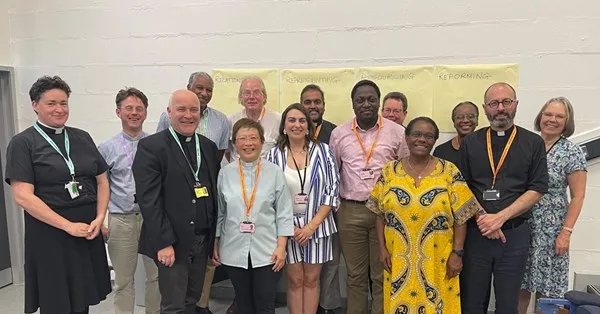
CONGREGATIONS are ill equipped to deal with the issue of contested heritage in churches, clergy discipline should include policy on racial discrimination, and more theological reflection is needed on reparation, a commission has reported.
These conclusions were published in the third biannual report from the Archbishops’ Commission for Racial Justice this month.
The Commission was announced by the Archbishops in 2021 after the publication of the report by the Archbishops’ Anti-racism Taskforce, From Lament to Action (News, 23 April 2021). Its 11 members are in their second year of work (News, 8 October 2021), meet monthly, and are required to report to the Archbishops every six months with recommendations on how to identify, respond to, and root out systemic racism in the Church.
The report begins by acknowledging the work of the Church’s new Racial Justice Unit (created in March), which has included placing racial-justice “champions” within dioceses and facilitating racial-justice training; supporting ethnocultural networks, such as the Anglican Minority Ethnic Network (AMEN) and Gypsy, Roma, and Travellers Friendly Church; commemorating the 75th anniversary of Windrush; and organising networking events for UKME clergy and laity.
A large section of the report is then given to theological reflection. “The Commission considers it vital that theological formation equips ministers from all backgrounds to be competent in cross-cultural mission to build up the diverse congregations of the future.” It also says: “Appropriate training needs to be provided for those involved in the system to help them handle the new issues that arise for the mission of the Church in cases of contested heritage.”
The report sets out a theological case for reparation and how reparation is defined, citing biblical understandings of and references to reconciliation, redemption, righteousness, restorative justice, and “interpreting the Bible in light of Empire” and colonial exploitation.
A further section focuses more closely on contested heritage in churches, in which the Commission “recommends the shift . . . towards recognising the unwelcoming reality of these memorials and lack of solace available to worshippers of specific heritages in buildings adorned with these contested artefacts”.
Recent legislative progress on the subject is set out (News, 30 June).
“It is the belief of the Commission that material culture with contested heritage is at odds with the Christian mission and the Church’s desire to reach diverse nationalities and GMH/UKME people, many of whom have colonial legacies as part of their heritage and could be afflicted by intergenerational trauma and present-day sociocultural and economic inequalities that are historically constructed.”
The Commission has also begun discussions with the Commonwealth War Graves Commission “to acknowledge those who have not been adequately memorialised within Britain and around the world”, the report says. It also refers to the work of the Liturgical Commission towards Persian-language liturgical resources.
Also being monitored by the Commission is the revision of the Clergy Discipline Measure, on which “the Commission seeks assurance that when the legislation is updated it will substantially address the concerns raised that GMH/UKME clergy are treated in [an] unequal manner.”
A grievance procedure and national bullying and harassment policy is needed, it says, as well as the gathering of baseline data on ethnic diversity and complaints on racial discrimination from which to measure future progress.
On vocations and leadership, the Commission suggests that more safe spaces are needed for UKME ordinands, “negative experiences of curacies and first incumbencies remain a challenge”, and that “Where counselling and care support is offered, often it is not culturally competent.”
The report continues: “Despite the racial-justice awareness in TEIs [theological educational institutions], there remains a lack of cultural awareness and an appreciation of the complexities of race and inclusiveness. There is a need for standards to be set not only on diversity in curriculum content but structures and processes that impact on equality, diversity, and inclusion.”
On funding, the Commission confirms that the new Racial Justice Triennium Fund of the Archbishops’ Council has approved £75 million to implement the work of Lament to Action on a diocesan level. It warns, however: “There is a sense that dioceses aren’t prioritising a racial-justice agenda to a sufficient degree, including not aggressively pursuing the funding which is now available.”
Addressing the Archbishops of Canterbury and York in a foreword to the report, the chair of the Commission, Lord Boateng, writes: “Slavers and Slave Owners continue to be celebrated and memorialised in many Cathedrals, Chapels, and Churches. . . The existing governance and legal structures are proving to be less than satisfactory in responding to the guidance and practical support challenge of congregations affected by the complexity of these issues.
“These congregations may lack the resources, knowledge and will to address all the complexities that arise. Parishes need the resources and Bishops the powers to deal effectively with a set of complex issues.”
Time would need to be allocated to the General Synod “as a matter of urgency” to pass legislation on this, he continued. “The existing preoccupations of the Church of England all too often seem to relegate racial justice to a secondary issue squeezed for time in your Councils and marginalised to the fringes of Synod.”
Lord Boateng also suggests: “The wider world is often left baffled by the priorities of the Church of England at a time of advancing secularism and deepening disadvantage, inequality and racial injustice.” He concludes: “Saying sorry is a start, but the offence of slavery is so grave, the hurt still raw and lasting, and the stain indelible without God’s Grace and Spur to action.”
Read the report here


